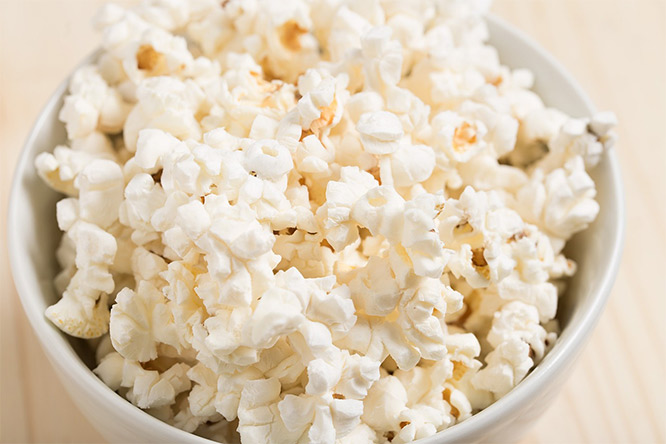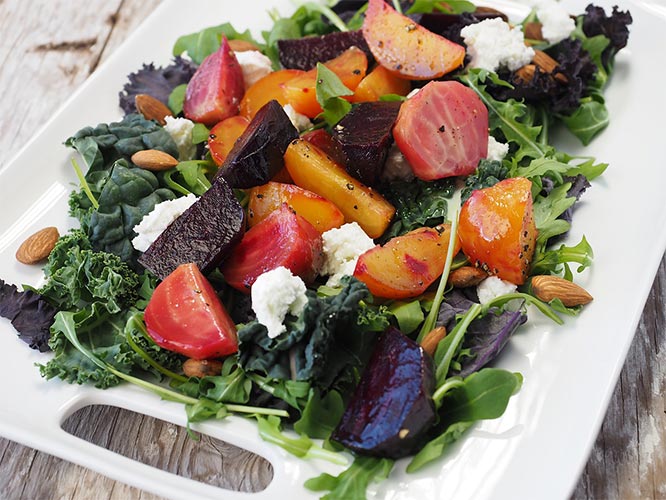
by Sofia Alves
We’ve all been there – 2 a.m. and you catch yourself roaming around the fridge, licking leftover crumbs from the cookie jar, addictively searching for more. “This is the last one”, you say hopelessly, “I promise”. When does all of the snacking end? How do you even stop it?
There are various reasons why we urge for eating in-between meals, from stress related issues to pure boredom. Nevertheless, it’s considered a bad habit that can interfere with your diet, hunger control, weight loss and even cause sleep deprivation. Luckily, understanding when, where and why we do it can be a first step in getting rid of this nasty habit.
The Psychology Behind Snacking – Why Do We Enjoy It So Much?
Food, as inevitable as it is, has always been an important part of cultural and national expression. We connect it to celebrations, reward, we enjoy the taste, the structure, the smell – everything about it. No wonder it’s become a great part of our everyday lives.
Research done on the relation between eating and emotions explains that there is a connection between consuming palatable food and stress relief.
Food Research International came to findings that what we call comfort food (usually junk food) triggers stress-induced eating and that it is mostly caused by motivational bursts and developed habit. This means that we tend to opt for mindless eating just out of habit, regardless of hunger or even flavor-related pleasure.
This is where snacks enter the scene and it’s pretty easy to understand why it is so tempting. The problem is, the more we need comfort and distraction, the worse food options we make. Snacks usually consist of prepackaged and processed foods that are high in sugar, sodium, fat and are unhealthy in general.
Another common reason for snacking is, believe it or not, boredom. This is connected with habitual behaviour, since we like things that we find familiar and safe.
Mindless snacking is something to be afraid of, since most of the times we are not in control of it. The best way to stop yourself from nibbling all the time is observing situations in which you crave snacks, the so-called triggering situations, which will show your habitual patterns of behaviour when it comes to eating.
How To Stop Mindless Snacking
Mindful eating is a thing – making a relaxing, meditative-like experience out of ingesting food.
Being more intentional around your snacks (and meals) will help you recognize when you’re full, therefore helping to keep your snacking in check.
Be mentally present when around food, try enjoying every bite slowly and thoroughly. You’ll notice the flavours being more intense and overpowering. Furthermore, the slower you eat, the quicker your brain gets the message that you are full.
Bringing awareness to your eating can be an eye-opening experience about how much you eat and actually need. This is an important step to take if you want to stop mindless snacking. In addition to this, also try the following tips:
- Don’t snack in front of the TV or when engaged in other activities. When your focus is on something else and not food, it’s all too easy to snack mindlessly and overeat.
- Avoid eating from a big package. When you eat from a big package, it’s very easy to get carried away and eat too much as you don’t know exactly how much you’ve eaten. Instead, buy smaller packages or put a small portion of your snack in a bowl so you know exactly how much you are eating. This portion control will stop you from snacking mindlessly but it’s even better if you don’t buy unhealthy snacks at all and instead have something healthy such as fruit salad or a handful of nuts.
- Use smaller plates or bowls. Another way of controlling your portions and preventing mindless snacking is by using smaller plates. This makes your portions look bigger than they are but also helps you limit the calories and the effects of mindless eating.

How To Stop Snacking When Bored
The winner among the most destructive triggering situations for snacking is definitely during free time. When bored, eating junk food in front of the TV seems to be a popular activity among people of all ages, especially kids.
To nip this awful habit in the bud, teach your children from the earliest age to make their free time quality time. If you feel the urge to snack on something because you’re just bored, snap out of it and make a conscious choice to do something productive instead – read a book, take a nice bath, start a new craft project, meet with friends, clean, take up a hobby – whatever makes you feel good about yourself.
Physical activity is a perfect cure for food cravings since it helps in releasing feel-good hormones like endorphins, responsible for your mood and anxiety control. The workout itself has to do a lot with appetite control, primarily due to the overall feeling of achievement and the sense of productively using your precious spare time. It’s important to make exercising a pleasant experience though. If it’s not fun enough to get you outside, it’s not going to stop you from quitting before you even started.
Next time you feel like a bottomless pit, try going for a run. Mindful jogging is a great activity for zoning out and focusing on your form and strength, instead of obsessing about food. It’s suitable for all ages and doesn’t require special athletic skill, which makes it suitable anytime, anywhere. Make it a relaxing experience – try turning it into an engaging hobby that you could turn to whenever tensed, stressed or unnecessarily hungry. Resources like Jogging Addiction and similar sites can help in getting informed about running gear, other runners’ advice and much more, to make the whole experience comfortable and doable.
How To Stop Snacking When At Work
Most of the sedentary or cubicle-like jobs are ideal for keeping the flame of snacking alive. Rushing in the morning and skipping breakfast, working at lunch break or late hours can make everyone skip meals and disturb the digestive system.
Lack of time for meal preparation and stressful situations at work are common triggers for snacking. A bag of crisps or order-in doughnuts seem like a quick and convenient solution.
If you want to snack less at work it is super important that you eat enough for your actual meals. If you don’t eat enough to fill yourself, the cravings for snacks will keep coming. Make sure you eat the fats and carbs your body requires to function properly. This is different for everybody. People with a more active lifestyle will require more food than people with a passive lifestyle and a sitting job.

Try meal-prepping and organize your three meals at the beginning of a week. When your brain knows there’s a plan, you’re more likely to be more mindful around food.
If that sounds too straining, there are always more healthy options to choose at the supermarket or to order in, like ready-made meat and vegetables, healthy salads, fruit, etc. Commit yourself to always having at least 3 proper meals during the day and stick to your plan – never skip a meal and predict any obstacles that can ruin your routine.
If you still have the urge to snack at work, also when you eat breakfast and proper lunch, following these tips may stop you from reaching for unhealthy treats:
- Have a glass of water. Sometimes we feel hungry but we are actually thirsty. Make sure you stay hydrated during the day and always have a glass of water on your desk.
- Go for a walk during your lunch hour. This will put some distance between you and the tempting office snacks and by the time you get back, your cravings will probably diminish.
- Have a chewing gum. If you are tempted by snacks that other people are eating, but you are not hungry, have chewing gum. The minty flavour is not the best match with any of the snacks so it will quickly stop you from putting anything else in your mouth.
- Enjoy some herbal tea. The experience of sipping nice herbal tea can easily take your thoughts off snacking. Just holding a cup of tea is comforting and soothing and many of herbal teas are naturally sweet which will help with sugar cravings.
How To Stop Snacking After Dinner
Full-time snackers know what a magnificent pleasure it is binging on snacks in your pyjamas, right before bed. No sticky sheets can ruin the pleasure of munching your favourite sweets, even though you’re not hungry at all. Unfortunately, eating late can cause insomnia and mess up with your sleeping rhythm, and even cause stomach cramps and pain in the morning.
Why we often feel hungry in the evening is mostly because the meals we already ate were just not rich and nutritious enough. This can also be regulated by changing your entire diet, but if you’re just a person who enjoys an evening snack, at least make it a healthy one.
There’s an array of tasty but healthy options to choose from and they don’t require a lot of effort or time for preparation. The fruit is a great substitute for candy since it balances out your sugar cravings. If you crave fats and carbs, eat a slice of avocado or a handful of nuts – this will satisfy your hunger without being harmful to your health.
To stop snacking after dinner also try the following:
- Find something else to do instead of snacking. Snacking is a pleasurable activity that has become a habit for many people. Especially after dinner. One way of stopping this habit is by finding something else to do that is also pleasurable. For example, you could try aromatherapy, create artwork or take a bath.
- Enjoy a cup of mint tea. Mint tea is a delicious herbal tea great for digestion after dinner but it’s also perfect for when you want to curb the appetite. Just smelling it may be enough but also drinking it is beneficial as it reduces stress and anxiety which are some of the reasons why people snack when they are not hungry.
- Eat more protein with your evening meal. Protein is more satisfying than other macronutrients as it helps you stay fuller for longer and also reduces appetite and hunger levels. If you need some inspiration on how to make your dinners higher in protein, check out these recipe ideas.
A Glass Of Water Can Go A Long Way
A nifty way of avoiding constant snacking is drinking some good-old water instead. In fact, most of the time you think you feel hungry but you’re actually thirsty and dehydrated. What’s more, a tall glass of water can temporarily trick your brain into not feeling hungry, just enough to manage until a proper meal. Regular water intake is important for a balanced diet and can significantly change the way you feel about food cravings.
Help Yourself – Just Don’t Buy It
Ask yourself – are there a whole bunch of snack foods in your cupboard just waiting for you to hit a weak moment? The easiest way not to eat snack foods is to just not buy them. This way you leave yourself with healthier options, like fruit or veggies that can be just as fun.
Most people find snacks delicious because of the texture and the crunchiness, rather than the taste and amount itself. Baby carrots, apple or banana chips are a great substitution that make the same effect, only being a much healthier choice. Sometimes making small changes can be more effective in the long run, than expecting perfection right away.
Conquer The Underlying Cause – Deal With Your Emotions
Often times we find ourselves mindlessly snacking because of certain emotions that are too overwhelming (loneliness, tiredness, anxiety, fear, etc). There’s always a way to distract yourself, but the most effective way to combat mindless eating is facing your emotions for good.
Understanding the cause of your restlessness will eliminate the situational trigger for craving snacks. In fact, emotional unravelling is beneficial for improving self-confidence and determination, which is very much connected to staying focused and motivated in decision-making processes. Getting the emotional burden off your chest will erase the need for external comforting in the form of food.
Last but not least: treat yourself every once in a while. There’s no harm in indulging yourself if you eat a piece of chocolate that you really love. This way you have something to look forward to and not feel too restrained in any way.
Sometimes keeping a healthy balance is the key to success. Keeping all of this in mind, you can approach snacking in a completely different manner and learn how to control your cravings when they become harmful. Next time you reach for a cookie, think about what brought you there and make a conscious, smarter choice.
Author bio
Sofia Alves is an avid runner, conveyor of messages, sunshine addict. Guided by the belief that health is a choice, she recently started sharing her knowledge as a contributing writer at Jogging Addiction. In her free time, you can usually find her sharing stories with friends over a glass of dry wine and a plate of her favourite pesto spaghetti.
